Understanding Operations, Logistics and Supply Chain in NHS
VerifiedAdded on 2020/07/23
|10
|3241
|73
Report
AI Summary
This report delves into the operational, logistical, and supply chain management practices within the National Health Service (NHS) in England. It begins with an introduction to operations management, logistics, and supply chain, highlighting their significance in achieving organizational efficiency and customer satisfaction. The report then critically reviews relevant theories, including business process redesign, six sigma, lean manufacturing, and reconfigurable manufacturing systems, and their application within the NHS context. An analytical discussion follows, examining specific issues such as poor service quality, unskilled staff, and low-quality medicines, providing concrete examples to illustrate these challenges. The report concludes with recommendations for improvements, emphasizing the importance of quality service, skilled personnel, and high-quality medicines to enhance the NHS's performance and its impact on society. The assignment aims to provide a comprehensive understanding of the NHS's operational challenges and potential solutions through the lens of established management theories.
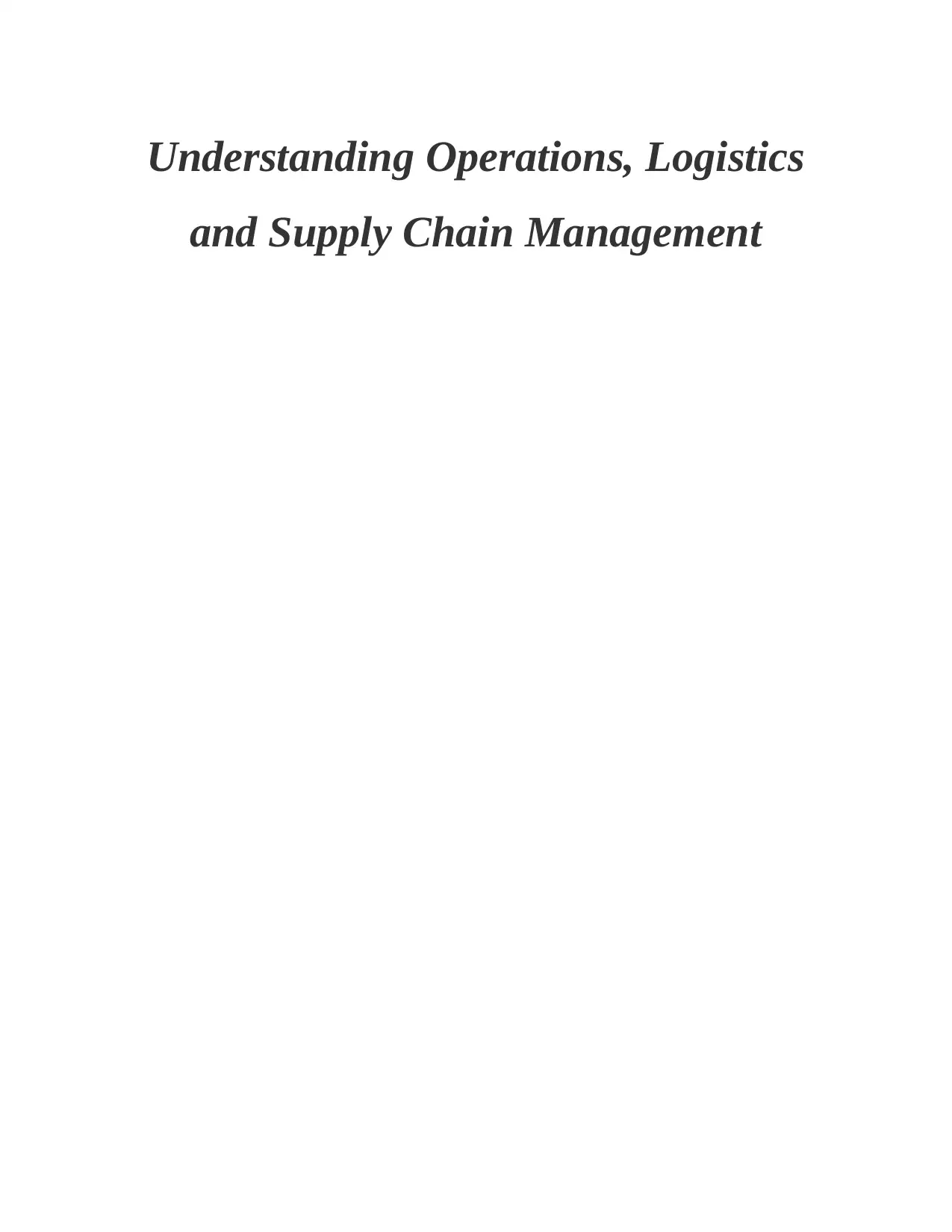
Understanding Operations, Logistics
and Supply Chain Management
and Supply Chain Management
Paraphrase This Document
Need a fresh take? Get an instant paraphrase of this document with our AI Paraphraser
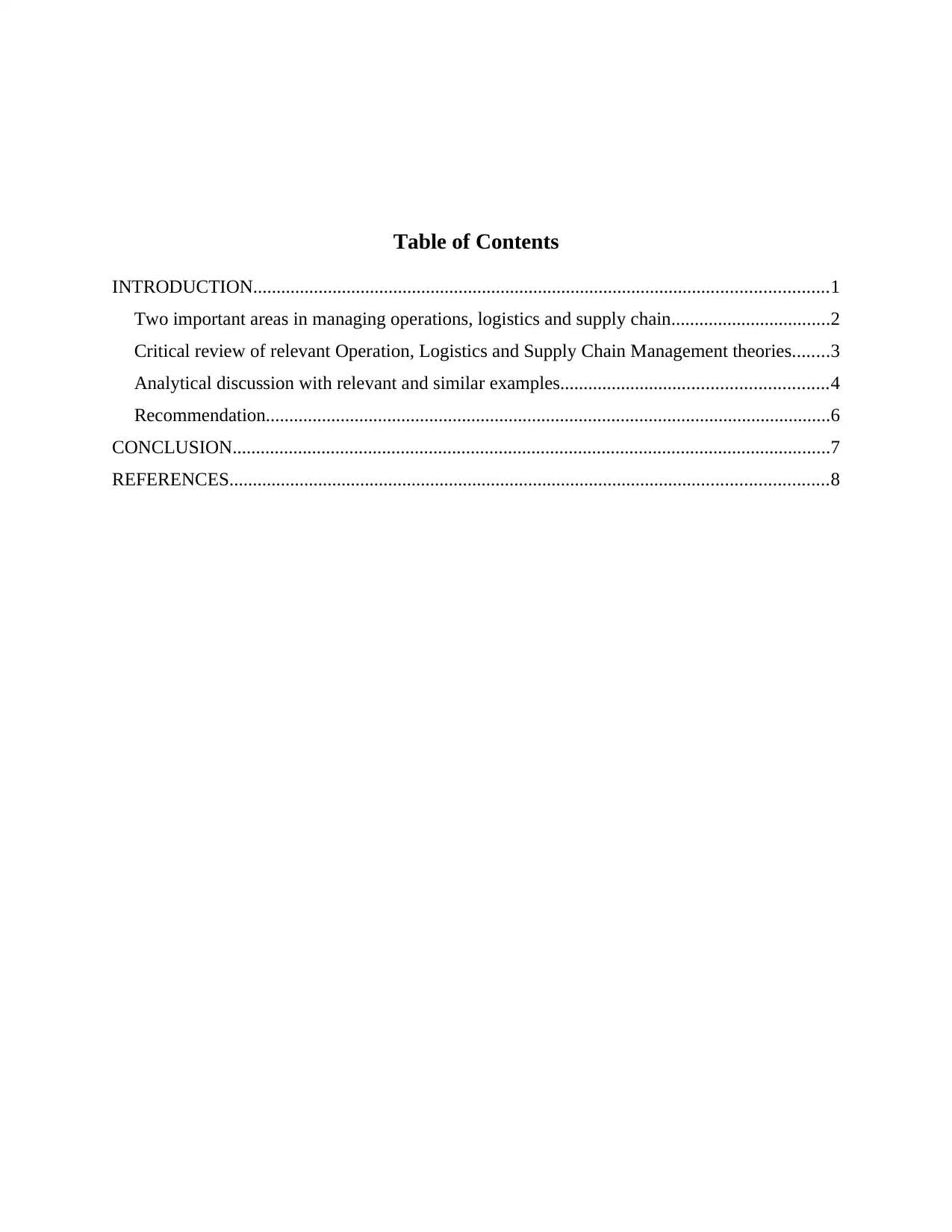
Table of Contents
INTRODUCTION...........................................................................................................................1
Two important areas in managing operations, logistics and supply chain..................................2
Critical review of relevant Operation, Logistics and Supply Chain Management theories........3
Analytical discussion with relevant and similar examples.........................................................4
Recommendation.........................................................................................................................6
CONCLUSION................................................................................................................................7
REFERENCES................................................................................................................................8
INTRODUCTION...........................................................................................................................1
Two important areas in managing operations, logistics and supply chain..................................2
Critical review of relevant Operation, Logistics and Supply Chain Management theories........3
Analytical discussion with relevant and similar examples.........................................................4
Recommendation.........................................................................................................................6
CONCLUSION................................................................................................................................7
REFERENCES................................................................................................................................8
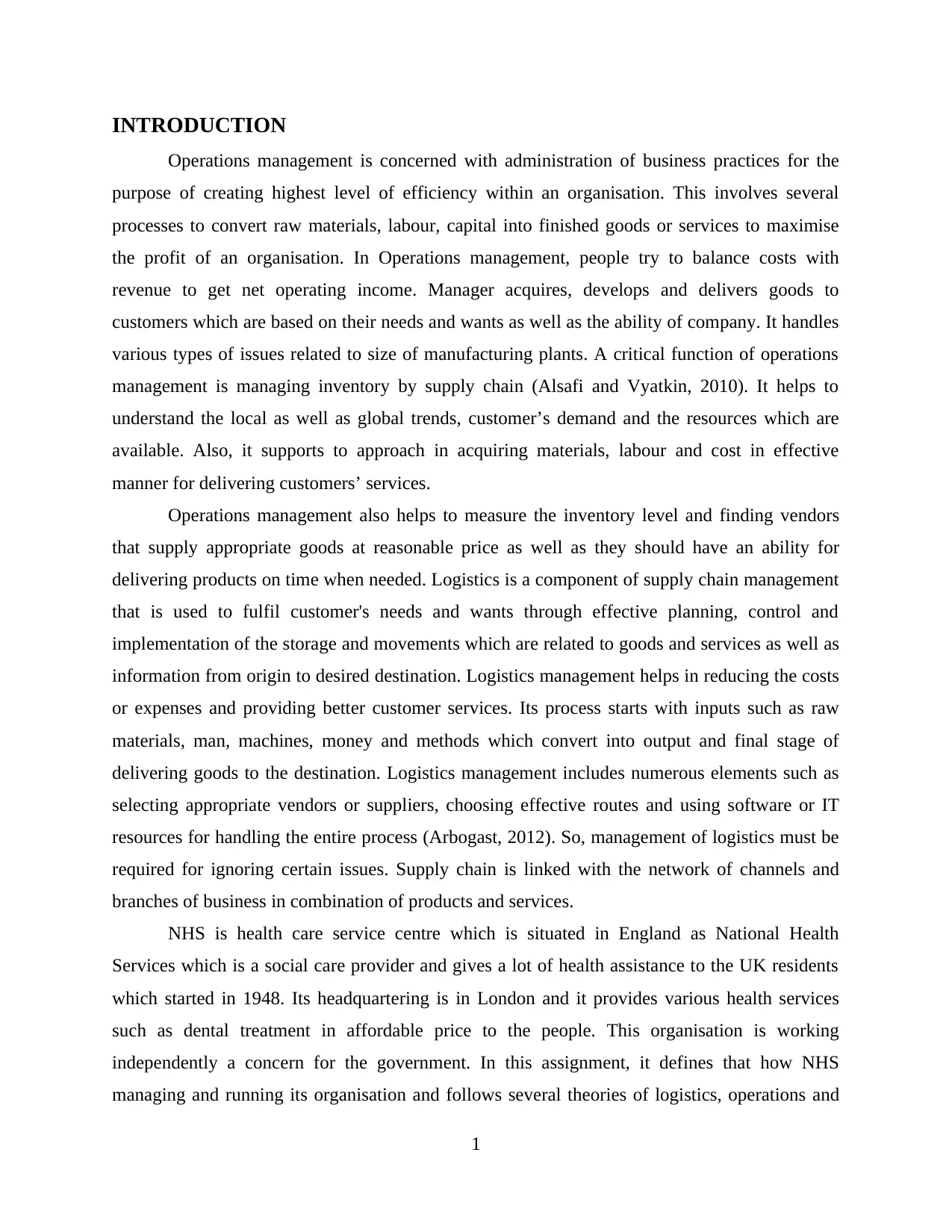
INTRODUCTION
Operations management is concerned with administration of business practices for the
purpose of creating highest level of efficiency within an organisation. This involves several
processes to convert raw materials, labour, capital into finished goods or services to maximise
the profit of an organisation. In Operations management, people try to balance costs with
revenue to get net operating income. Manager acquires, develops and delivers goods to
customers which are based on their needs and wants as well as the ability of company. It handles
various types of issues related to size of manufacturing plants. A critical function of operations
management is managing inventory by supply chain (Alsafi and Vyatkin, 2010). It helps to
understand the local as well as global trends, customer’s demand and the resources which are
available. Also, it supports to approach in acquiring materials, labour and cost in effective
manner for delivering customers’ services.
Operations management also helps to measure the inventory level and finding vendors
that supply appropriate goods at reasonable price as well as they should have an ability for
delivering products on time when needed. Logistics is a component of supply chain management
that is used to fulfil customer's needs and wants through effective planning, control and
implementation of the storage and movements which are related to goods and services as well as
information from origin to desired destination. Logistics management helps in reducing the costs
or expenses and providing better customer services. Its process starts with inputs such as raw
materials, man, machines, money and methods which convert into output and final stage of
delivering goods to the destination. Logistics management includes numerous elements such as
selecting appropriate vendors or suppliers, choosing effective routes and using software or IT
resources for handling the entire process (Arbogast, 2012). So, management of logistics must be
required for ignoring certain issues. Supply chain is linked with the network of channels and
branches of business in combination of products and services.
NHS is health care service centre which is situated in England as National Health
Services which is a social care provider and gives a lot of health assistance to the UK residents
which started in 1948. Its headquartering is in London and it provides various health services
such as dental treatment in affordable price to the people. This organisation is working
independently a concern for the government. In this assignment, it defines that how NHS
managing and running its organisation and follows several theories of logistics, operations and
1
Operations management is concerned with administration of business practices for the
purpose of creating highest level of efficiency within an organisation. This involves several
processes to convert raw materials, labour, capital into finished goods or services to maximise
the profit of an organisation. In Operations management, people try to balance costs with
revenue to get net operating income. Manager acquires, develops and delivers goods to
customers which are based on their needs and wants as well as the ability of company. It handles
various types of issues related to size of manufacturing plants. A critical function of operations
management is managing inventory by supply chain (Alsafi and Vyatkin, 2010). It helps to
understand the local as well as global trends, customer’s demand and the resources which are
available. Also, it supports to approach in acquiring materials, labour and cost in effective
manner for delivering customers’ services.
Operations management also helps to measure the inventory level and finding vendors
that supply appropriate goods at reasonable price as well as they should have an ability for
delivering products on time when needed. Logistics is a component of supply chain management
that is used to fulfil customer's needs and wants through effective planning, control and
implementation of the storage and movements which are related to goods and services as well as
information from origin to desired destination. Logistics management helps in reducing the costs
or expenses and providing better customer services. Its process starts with inputs such as raw
materials, man, machines, money and methods which convert into output and final stage of
delivering goods to the destination. Logistics management includes numerous elements such as
selecting appropriate vendors or suppliers, choosing effective routes and using software or IT
resources for handling the entire process (Arbogast, 2012). So, management of logistics must be
required for ignoring certain issues. Supply chain is linked with the network of channels and
branches of business in combination of products and services.
NHS is health care service centre which is situated in England as National Health
Services which is a social care provider and gives a lot of health assistance to the UK residents
which started in 1948. Its headquartering is in London and it provides various health services
such as dental treatment in affordable price to the people. This organisation is working
independently a concern for the government. In this assignment, it defines that how NHS
managing and running its organisation and follows several theories of logistics, operations and
1
⊘ This is a preview!⊘
Do you want full access?
Subscribe today to unlock all pages.

Trusted by 1+ million students worldwide
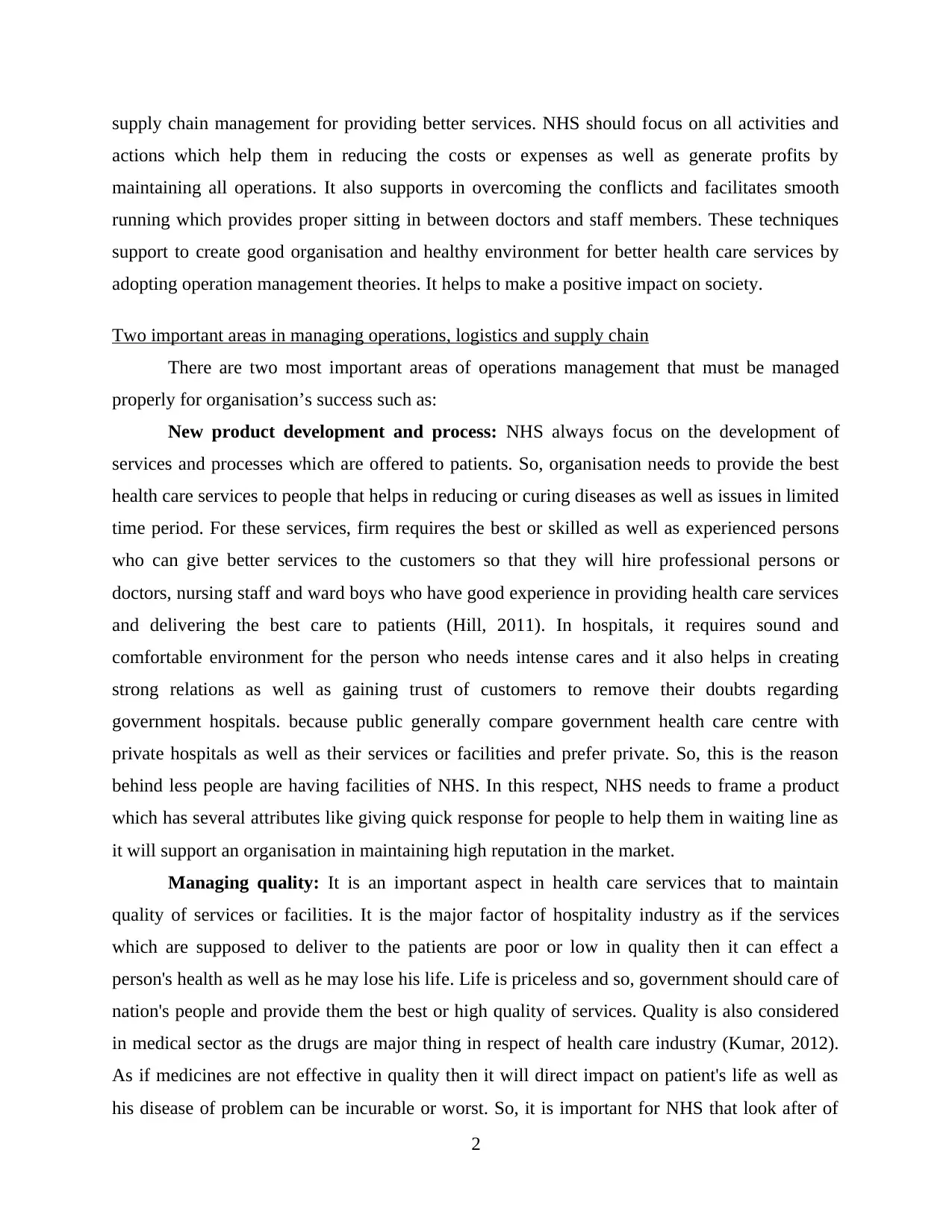
supply chain management for providing better services. NHS should focus on all activities and
actions which help them in reducing the costs or expenses as well as generate profits by
maintaining all operations. It also supports in overcoming the conflicts and facilitates smooth
running which provides proper sitting in between doctors and staff members. These techniques
support to create good organisation and healthy environment for better health care services by
adopting operation management theories. It helps to make a positive impact on society.
Two important areas in managing operations, logistics and supply chain
There are two most important areas of operations management that must be managed
properly for organisation’s success such as:
New product development and process: NHS always focus on the development of
services and processes which are offered to patients. So, organisation needs to provide the best
health care services to people that helps in reducing or curing diseases as well as issues in limited
time period. For these services, firm requires the best or skilled as well as experienced persons
who can give better services to the customers so that they will hire professional persons or
doctors, nursing staff and ward boys who have good experience in providing health care services
and delivering the best care to patients (Hill, 2011). In hospitals, it requires sound and
comfortable environment for the person who needs intense cares and it also helps in creating
strong relations as well as gaining trust of customers to remove their doubts regarding
government hospitals. because public generally compare government health care centre with
private hospitals as well as their services or facilities and prefer private. So, this is the reason
behind less people are having facilities of NHS. In this respect, NHS needs to frame a product
which has several attributes like giving quick response for people to help them in waiting line as
it will support an organisation in maintaining high reputation in the market.
Managing quality: It is an important aspect in health care services that to maintain
quality of services or facilities. It is the major factor of hospitality industry as if the services
which are supposed to deliver to the patients are poor or low in quality then it can effect a
person's health as well as he may lose his life. Life is priceless and so, government should care of
nation's people and provide them the best or high quality of services. Quality is also considered
in medical sector as the drugs are major thing in respect of health care industry (Kumar, 2012).
As if medicines are not effective in quality then it will direct impact on patient's life as well as
his disease of problem can be incurable or worst. So, it is important for NHS that look after of
2
actions which help them in reducing the costs or expenses as well as generate profits by
maintaining all operations. It also supports in overcoming the conflicts and facilitates smooth
running which provides proper sitting in between doctors and staff members. These techniques
support to create good organisation and healthy environment for better health care services by
adopting operation management theories. It helps to make a positive impact on society.
Two important areas in managing operations, logistics and supply chain
There are two most important areas of operations management that must be managed
properly for organisation’s success such as:
New product development and process: NHS always focus on the development of
services and processes which are offered to patients. So, organisation needs to provide the best
health care services to people that helps in reducing or curing diseases as well as issues in limited
time period. For these services, firm requires the best or skilled as well as experienced persons
who can give better services to the customers so that they will hire professional persons or
doctors, nursing staff and ward boys who have good experience in providing health care services
and delivering the best care to patients (Hill, 2011). In hospitals, it requires sound and
comfortable environment for the person who needs intense cares and it also helps in creating
strong relations as well as gaining trust of customers to remove their doubts regarding
government hospitals. because public generally compare government health care centre with
private hospitals as well as their services or facilities and prefer private. So, this is the reason
behind less people are having facilities of NHS. In this respect, NHS needs to frame a product
which has several attributes like giving quick response for people to help them in waiting line as
it will support an organisation in maintaining high reputation in the market.
Managing quality: It is an important aspect in health care services that to maintain
quality of services or facilities. It is the major factor of hospitality industry as if the services
which are supposed to deliver to the patients are poor or low in quality then it can effect a
person's health as well as he may lose his life. Life is priceless and so, government should care of
nation's people and provide them the best or high quality of services. Quality is also considered
in medical sector as the drugs are major thing in respect of health care industry (Kumar, 2012).
As if medicines are not effective in quality then it will direct impact on patient's life as well as
his disease of problem can be incurable or worst. So, it is important for NHS that look after of
2
Paraphrase This Document
Need a fresh take? Get an instant paraphrase of this document with our AI Paraphraser
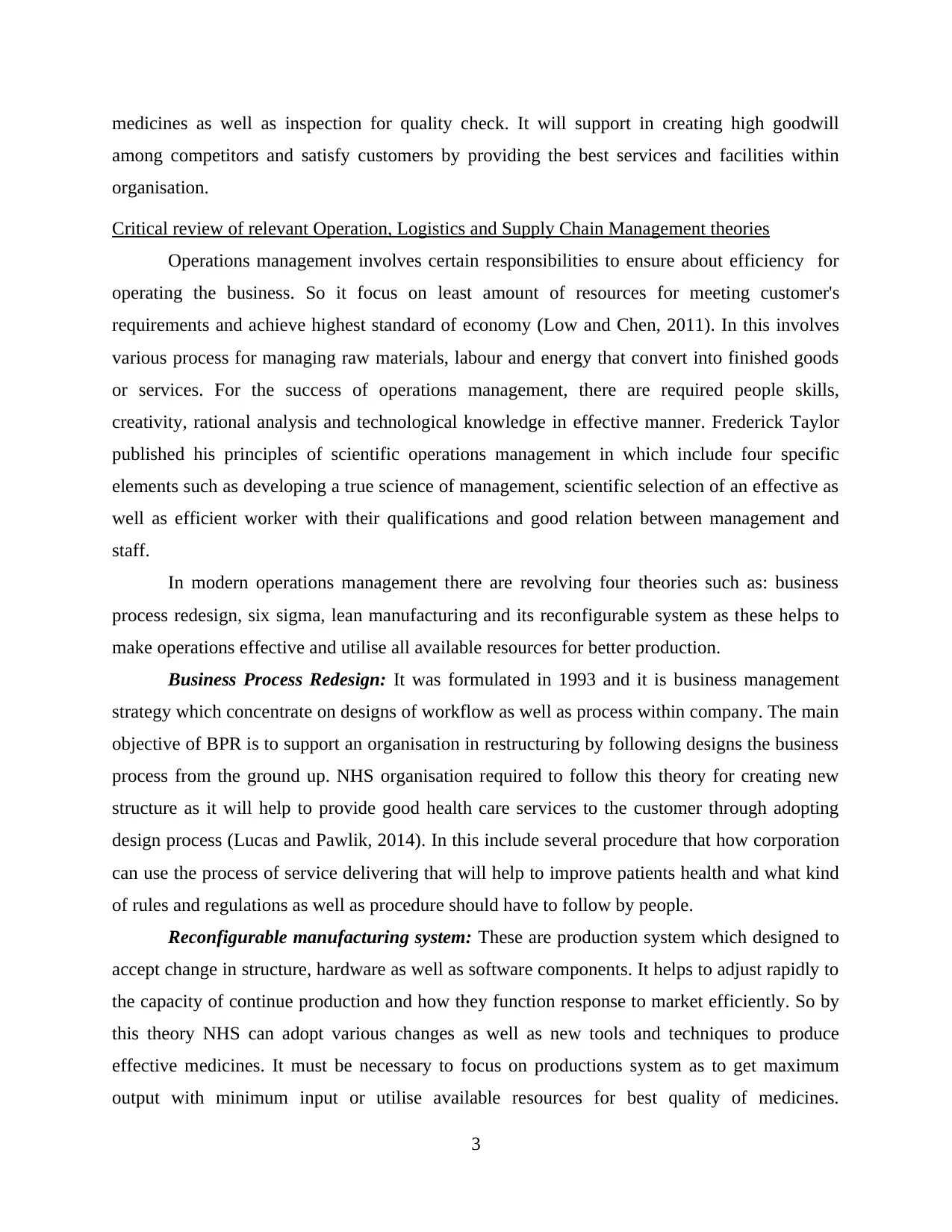
medicines as well as inspection for quality check. It will support in creating high goodwill
among competitors and satisfy customers by providing the best services and facilities within
organisation.
Critical review of relevant Operation, Logistics and Supply Chain Management theories
Operations management involves certain responsibilities to ensure about efficiency for
operating the business. So it focus on least amount of resources for meeting customer's
requirements and achieve highest standard of economy (Low and Chen, 2011). In this involves
various process for managing raw materials, labour and energy that convert into finished goods
or services. For the success of operations management, there are required people skills,
creativity, rational analysis and technological knowledge in effective manner. Frederick Taylor
published his principles of scientific operations management in which include four specific
elements such as developing a true science of management, scientific selection of an effective as
well as efficient worker with their qualifications and good relation between management and
staff.
In modern operations management there are revolving four theories such as: business
process redesign, six sigma, lean manufacturing and its reconfigurable system as these helps to
make operations effective and utilise all available resources for better production.
Business Process Redesign: It was formulated in 1993 and it is business management
strategy which concentrate on designs of workflow as well as process within company. The main
objective of BPR is to support an organisation in restructuring by following designs the business
process from the ground up. NHS organisation required to follow this theory for creating new
structure as it will help to provide good health care services to the customer through adopting
design process (Lucas and Pawlik, 2014). In this include several procedure that how corporation
can use the process of service delivering that will help to improve patients health and what kind
of rules and regulations as well as procedure should have to follow by people.
Reconfigurable manufacturing system: These are production system which designed to
accept change in structure, hardware as well as software components. It helps to adjust rapidly to
the capacity of continue production and how they function response to market efficiently. So by
this theory NHS can adopt various changes as well as new tools and techniques to produce
effective medicines. It must be necessary to focus on productions system as to get maximum
output with minimum input or utilise available resources for best quality of medicines.
3
among competitors and satisfy customers by providing the best services and facilities within
organisation.
Critical review of relevant Operation, Logistics and Supply Chain Management theories
Operations management involves certain responsibilities to ensure about efficiency for
operating the business. So it focus on least amount of resources for meeting customer's
requirements and achieve highest standard of economy (Low and Chen, 2011). In this involves
various process for managing raw materials, labour and energy that convert into finished goods
or services. For the success of operations management, there are required people skills,
creativity, rational analysis and technological knowledge in effective manner. Frederick Taylor
published his principles of scientific operations management in which include four specific
elements such as developing a true science of management, scientific selection of an effective as
well as efficient worker with their qualifications and good relation between management and
staff.
In modern operations management there are revolving four theories such as: business
process redesign, six sigma, lean manufacturing and its reconfigurable system as these helps to
make operations effective and utilise all available resources for better production.
Business Process Redesign: It was formulated in 1993 and it is business management
strategy which concentrate on designs of workflow as well as process within company. The main
objective of BPR is to support an organisation in restructuring by following designs the business
process from the ground up. NHS organisation required to follow this theory for creating new
structure as it will help to provide good health care services to the customer through adopting
design process (Lucas and Pawlik, 2014). In this include several procedure that how corporation
can use the process of service delivering that will help to improve patients health and what kind
of rules and regulations as well as procedure should have to follow by people.
Reconfigurable manufacturing system: These are production system which designed to
accept change in structure, hardware as well as software components. It helps to adjust rapidly to
the capacity of continue production and how they function response to market efficiently. So by
this theory NHS can adopt various changes as well as new tools and techniques to produce
effective medicines. It must be necessary to focus on productions system as to get maximum
output with minimum input or utilise available resources for best quality of medicines.
3
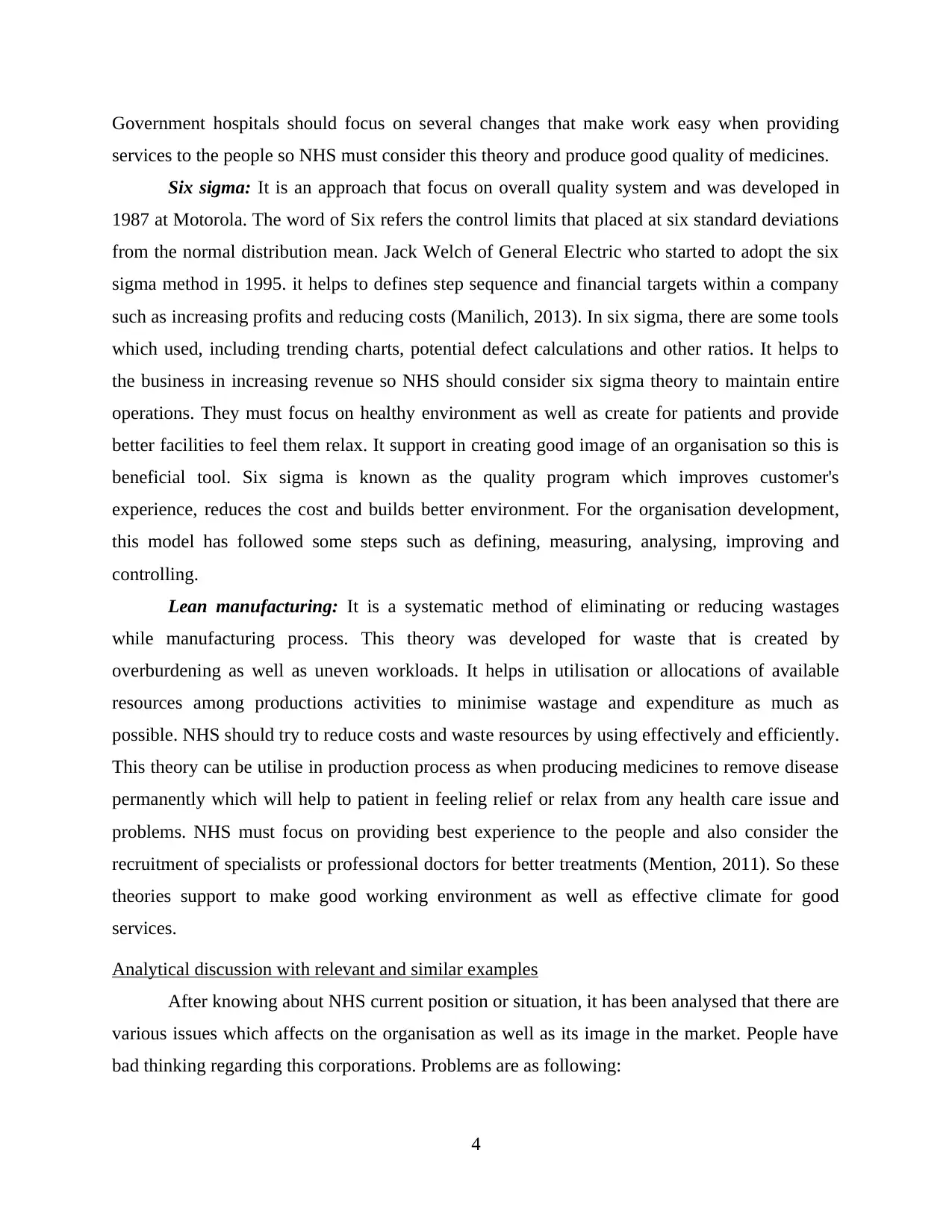
Government hospitals should focus on several changes that make work easy when providing
services to the people so NHS must consider this theory and produce good quality of medicines.
Six sigma: It is an approach that focus on overall quality system and was developed in
1987 at Motorola. The word of Six refers the control limits that placed at six standard deviations
from the normal distribution mean. Jack Welch of General Electric who started to adopt the six
sigma method in 1995. it helps to defines step sequence and financial targets within a company
such as increasing profits and reducing costs (Manilich, 2013). In six sigma, there are some tools
which used, including trending charts, potential defect calculations and other ratios. It helps to
the business in increasing revenue so NHS should consider six sigma theory to maintain entire
operations. They must focus on healthy environment as well as create for patients and provide
better facilities to feel them relax. It support in creating good image of an organisation so this is
beneficial tool. Six sigma is known as the quality program which improves customer's
experience, reduces the cost and builds better environment. For the organisation development,
this model has followed some steps such as defining, measuring, analysing, improving and
controlling.
Lean manufacturing: It is a systematic method of eliminating or reducing wastages
while manufacturing process. This theory was developed for waste that is created by
overburdening as well as uneven workloads. It helps in utilisation or allocations of available
resources among productions activities to minimise wastage and expenditure as much as
possible. NHS should try to reduce costs and waste resources by using effectively and efficiently.
This theory can be utilise in production process as when producing medicines to remove disease
permanently which will help to patient in feeling relief or relax from any health care issue and
problems. NHS must focus on providing best experience to the people and also consider the
recruitment of specialists or professional doctors for better treatments (Mention, 2011). So these
theories support to make good working environment as well as effective climate for good
services.
Analytical discussion with relevant and similar examples
After knowing about NHS current position or situation, it has been analysed that there are
various issues which affects on the organisation as well as its image in the market. People have
bad thinking regarding this corporations. Problems are as following:
4
services to the people so NHS must consider this theory and produce good quality of medicines.
Six sigma: It is an approach that focus on overall quality system and was developed in
1987 at Motorola. The word of Six refers the control limits that placed at six standard deviations
from the normal distribution mean. Jack Welch of General Electric who started to adopt the six
sigma method in 1995. it helps to defines step sequence and financial targets within a company
such as increasing profits and reducing costs (Manilich, 2013). In six sigma, there are some tools
which used, including trending charts, potential defect calculations and other ratios. It helps to
the business in increasing revenue so NHS should consider six sigma theory to maintain entire
operations. They must focus on healthy environment as well as create for patients and provide
better facilities to feel them relax. It support in creating good image of an organisation so this is
beneficial tool. Six sigma is known as the quality program which improves customer's
experience, reduces the cost and builds better environment. For the organisation development,
this model has followed some steps such as defining, measuring, analysing, improving and
controlling.
Lean manufacturing: It is a systematic method of eliminating or reducing wastages
while manufacturing process. This theory was developed for waste that is created by
overburdening as well as uneven workloads. It helps in utilisation or allocations of available
resources among productions activities to minimise wastage and expenditure as much as
possible. NHS should try to reduce costs and waste resources by using effectively and efficiently.
This theory can be utilise in production process as when producing medicines to remove disease
permanently which will help to patient in feeling relief or relax from any health care issue and
problems. NHS must focus on providing best experience to the people and also consider the
recruitment of specialists or professional doctors for better treatments (Mention, 2011). So these
theories support to make good working environment as well as effective climate for good
services.
Analytical discussion with relevant and similar examples
After knowing about NHS current position or situation, it has been analysed that there are
various issues which affects on the organisation as well as its image in the market. People have
bad thinking regarding this corporations. Problems are as following:
4
⊘ This is a preview!⊘
Do you want full access?
Subscribe today to unlock all pages.

Trusted by 1+ million students worldwide
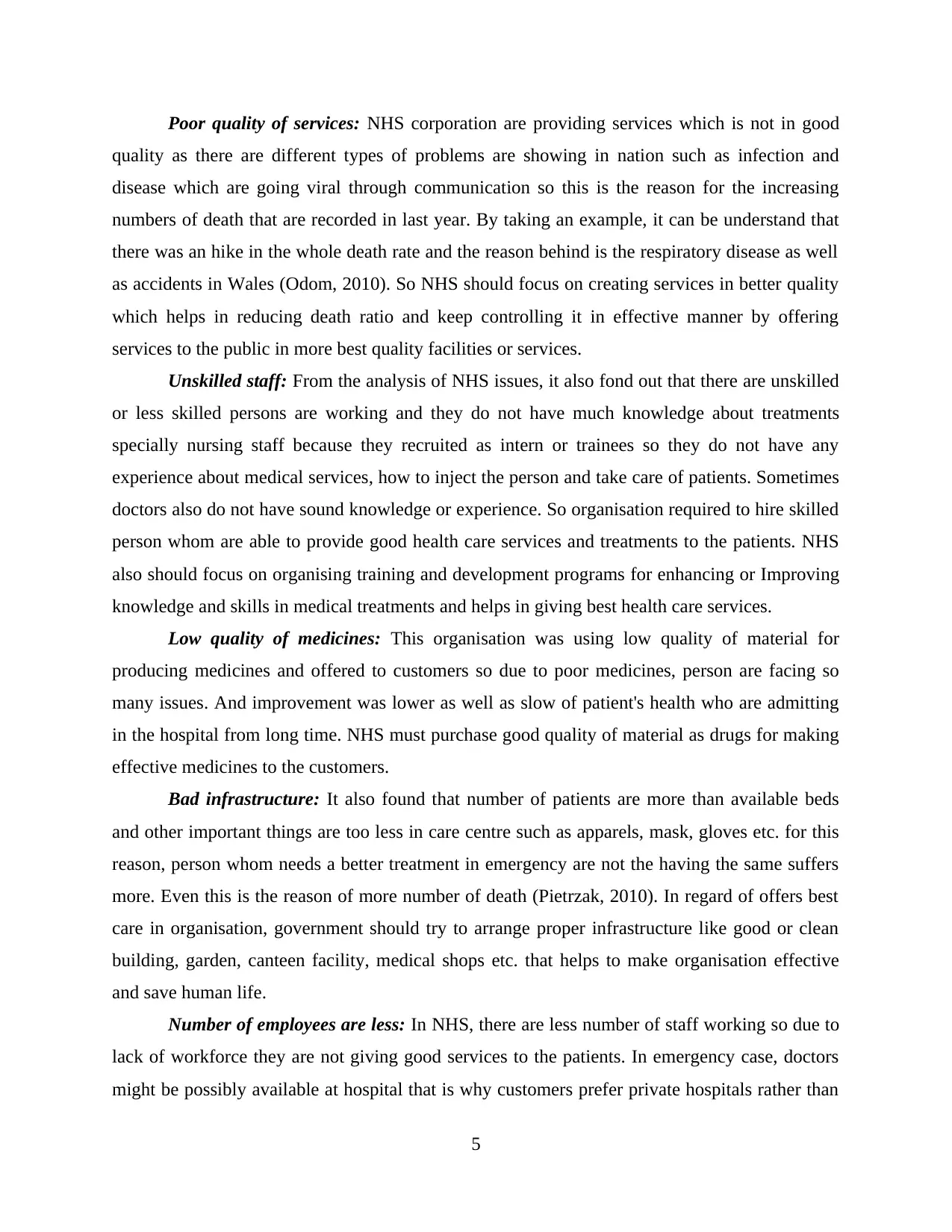
Poor quality of services: NHS corporation are providing services which is not in good
quality as there are different types of problems are showing in nation such as infection and
disease which are going viral through communication so this is the reason for the increasing
numbers of death that are recorded in last year. By taking an example, it can be understand that
there was an hike in the whole death rate and the reason behind is the respiratory disease as well
as accidents in Wales (Odom, 2010). So NHS should focus on creating services in better quality
which helps in reducing death ratio and keep controlling it in effective manner by offering
services to the public in more best quality facilities or services.
Unskilled staff: From the analysis of NHS issues, it also fond out that there are unskilled
or less skilled persons are working and they do not have much knowledge about treatments
specially nursing staff because they recruited as intern or trainees so they do not have any
experience about medical services, how to inject the person and take care of patients. Sometimes
doctors also do not have sound knowledge or experience. So organisation required to hire skilled
person whom are able to provide good health care services and treatments to the patients. NHS
also should focus on organising training and development programs for enhancing or Improving
knowledge and skills in medical treatments and helps in giving best health care services.
Low quality of medicines: This organisation was using low quality of material for
producing medicines and offered to customers so due to poor medicines, person are facing so
many issues. And improvement was lower as well as slow of patient's health who are admitting
in the hospital from long time. NHS must purchase good quality of material as drugs for making
effective medicines to the customers.
Bad infrastructure: It also found that number of patients are more than available beds
and other important things are too less in care centre such as apparels, mask, gloves etc. for this
reason, person whom needs a better treatment in emergency are not the having the same suffers
more. Even this is the reason of more number of death (Pietrzak, 2010). In regard of offers best
care in organisation, government should try to arrange proper infrastructure like good or clean
building, garden, canteen facility, medical shops etc. that helps to make organisation effective
and save human life.
Number of employees are less: In NHS, there are less number of staff working so due to
lack of workforce they are not giving good services to the patients. In emergency case, doctors
might be possibly available at hospital that is why customers prefer private hospitals rather than
5
quality as there are different types of problems are showing in nation such as infection and
disease which are going viral through communication so this is the reason for the increasing
numbers of death that are recorded in last year. By taking an example, it can be understand that
there was an hike in the whole death rate and the reason behind is the respiratory disease as well
as accidents in Wales (Odom, 2010). So NHS should focus on creating services in better quality
which helps in reducing death ratio and keep controlling it in effective manner by offering
services to the public in more best quality facilities or services.
Unskilled staff: From the analysis of NHS issues, it also fond out that there are unskilled
or less skilled persons are working and they do not have much knowledge about treatments
specially nursing staff because they recruited as intern or trainees so they do not have any
experience about medical services, how to inject the person and take care of patients. Sometimes
doctors also do not have sound knowledge or experience. So organisation required to hire skilled
person whom are able to provide good health care services and treatments to the patients. NHS
also should focus on organising training and development programs for enhancing or Improving
knowledge and skills in medical treatments and helps in giving best health care services.
Low quality of medicines: This organisation was using low quality of material for
producing medicines and offered to customers so due to poor medicines, person are facing so
many issues. And improvement was lower as well as slow of patient's health who are admitting
in the hospital from long time. NHS must purchase good quality of material as drugs for making
effective medicines to the customers.
Bad infrastructure: It also found that number of patients are more than available beds
and other important things are too less in care centre such as apparels, mask, gloves etc. for this
reason, person whom needs a better treatment in emergency are not the having the same suffers
more. Even this is the reason of more number of death (Pietrzak, 2010). In regard of offers best
care in organisation, government should try to arrange proper infrastructure like good or clean
building, garden, canteen facility, medical shops etc. that helps to make organisation effective
and save human life.
Number of employees are less: In NHS, there are less number of staff working so due to
lack of workforce they are not giving good services to the patients. In emergency case, doctors
might be possibly available at hospital that is why customers prefer private hospitals rather than
5
Paraphrase This Document
Need a fresh take? Get an instant paraphrase of this document with our AI Paraphraser
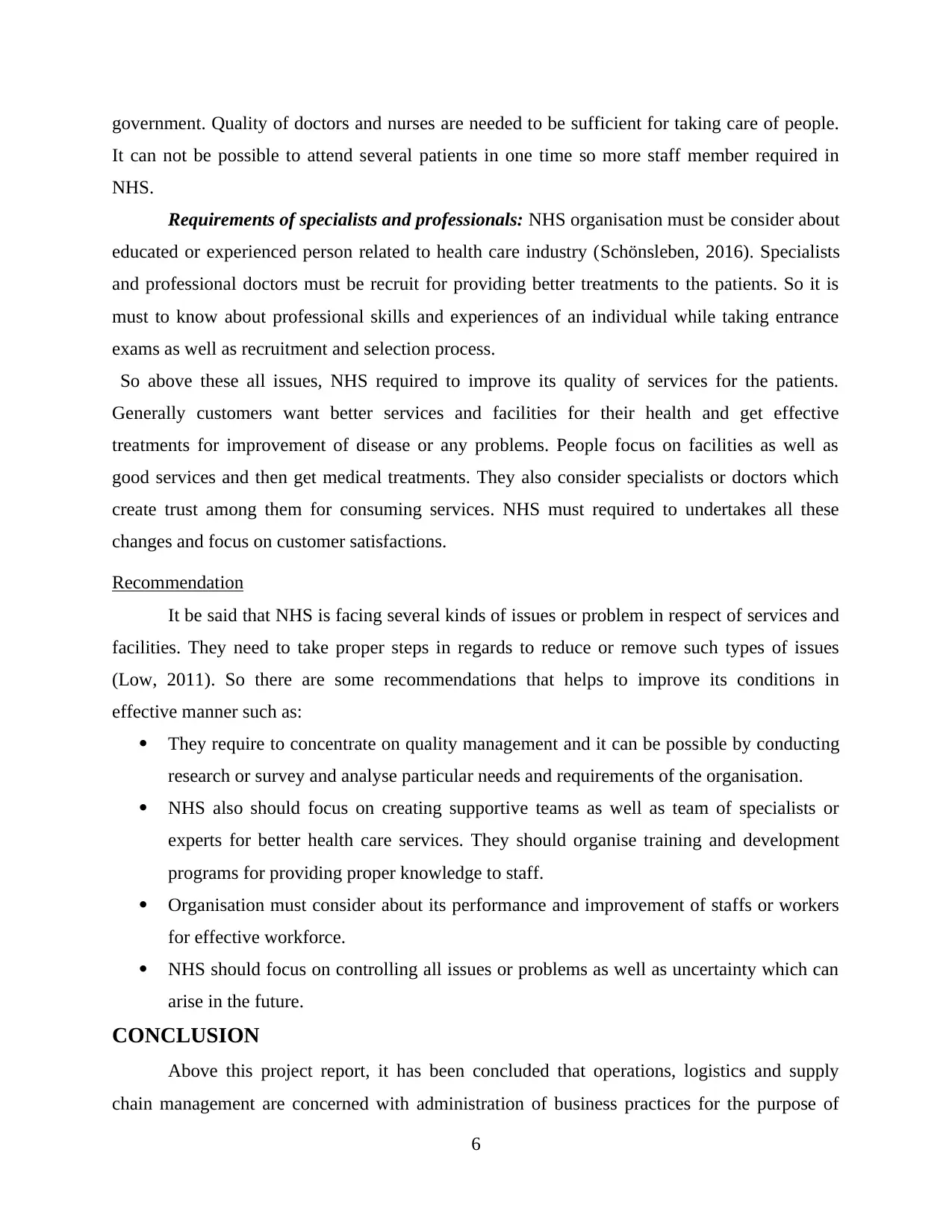
government. Quality of doctors and nurses are needed to be sufficient for taking care of people.
It can not be possible to attend several patients in one time so more staff member required in
NHS.
Requirements of specialists and professionals: NHS organisation must be consider about
educated or experienced person related to health care industry (Schönsleben, 2016). Specialists
and professional doctors must be recruit for providing better treatments to the patients. So it is
must to know about professional skills and experiences of an individual while taking entrance
exams as well as recruitment and selection process.
So above these all issues, NHS required to improve its quality of services for the patients.
Generally customers want better services and facilities for their health and get effective
treatments for improvement of disease or any problems. People focus on facilities as well as
good services and then get medical treatments. They also consider specialists or doctors which
create trust among them for consuming services. NHS must required to undertakes all these
changes and focus on customer satisfactions.
Recommendation
It be said that NHS is facing several kinds of issues or problem in respect of services and
facilities. They need to take proper steps in regards to reduce or remove such types of issues
(Low, 2011). So there are some recommendations that helps to improve its conditions in
effective manner such as:
They require to concentrate on quality management and it can be possible by conducting
research or survey and analyse particular needs and requirements of the organisation.
NHS also should focus on creating supportive teams as well as team of specialists or
experts for better health care services. They should organise training and development
programs for providing proper knowledge to staff.
Organisation must consider about its performance and improvement of staffs or workers
for effective workforce.
NHS should focus on controlling all issues or problems as well as uncertainty which can
arise in the future.
CONCLUSION
Above this project report, it has been concluded that operations, logistics and supply
chain management are concerned with administration of business practices for the purpose of
6
It can not be possible to attend several patients in one time so more staff member required in
NHS.
Requirements of specialists and professionals: NHS organisation must be consider about
educated or experienced person related to health care industry (Schönsleben, 2016). Specialists
and professional doctors must be recruit for providing better treatments to the patients. So it is
must to know about professional skills and experiences of an individual while taking entrance
exams as well as recruitment and selection process.
So above these all issues, NHS required to improve its quality of services for the patients.
Generally customers want better services and facilities for their health and get effective
treatments for improvement of disease or any problems. People focus on facilities as well as
good services and then get medical treatments. They also consider specialists or doctors which
create trust among them for consuming services. NHS must required to undertakes all these
changes and focus on customer satisfactions.
Recommendation
It be said that NHS is facing several kinds of issues or problem in respect of services and
facilities. They need to take proper steps in regards to reduce or remove such types of issues
(Low, 2011). So there are some recommendations that helps to improve its conditions in
effective manner such as:
They require to concentrate on quality management and it can be possible by conducting
research or survey and analyse particular needs and requirements of the organisation.
NHS also should focus on creating supportive teams as well as team of specialists or
experts for better health care services. They should organise training and development
programs for providing proper knowledge to staff.
Organisation must consider about its performance and improvement of staffs or workers
for effective workforce.
NHS should focus on controlling all issues or problems as well as uncertainty which can
arise in the future.
CONCLUSION
Above this project report, it has been concluded that operations, logistics and supply
chain management are concerned with administration of business practices for the purpose of
6
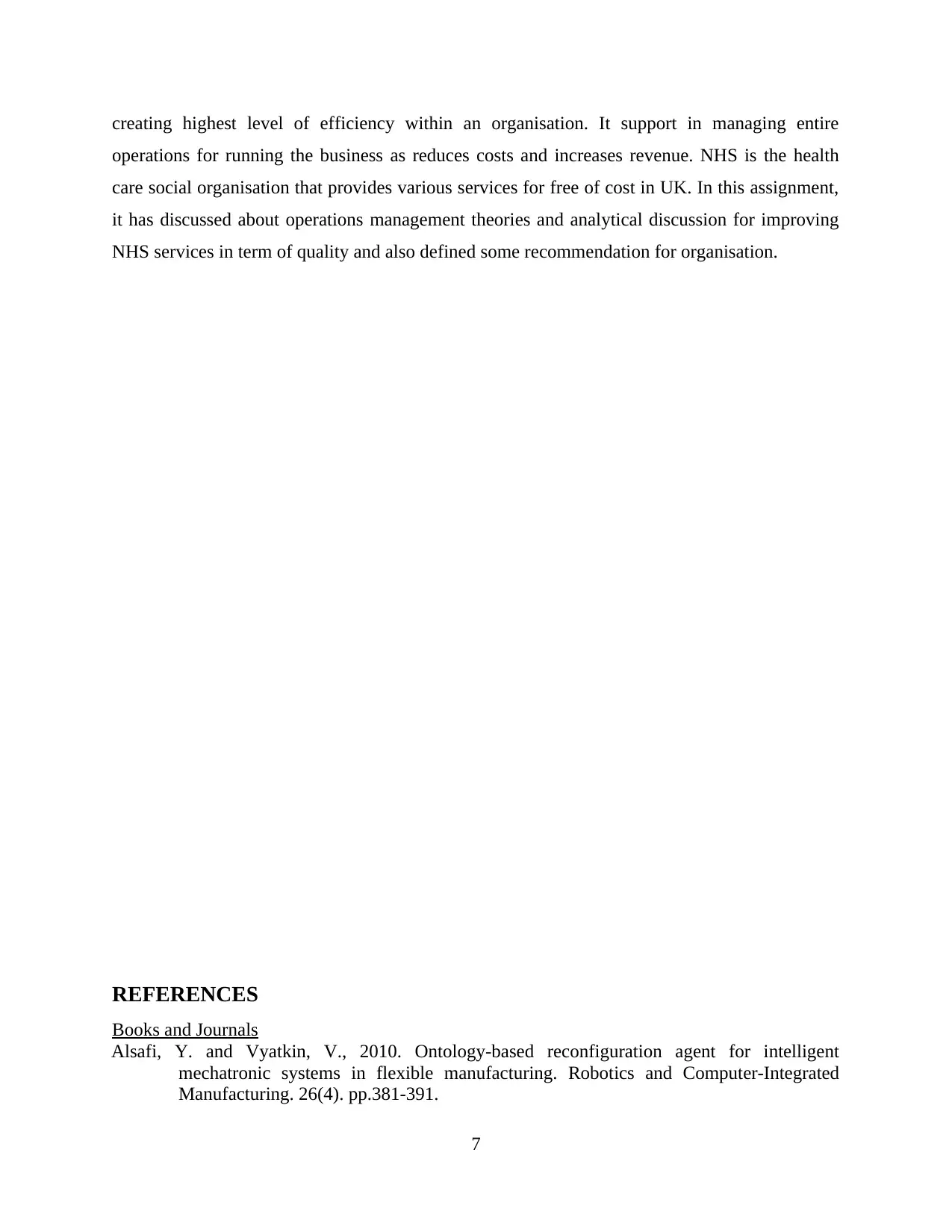
creating highest level of efficiency within an organisation. It support in managing entire
operations for running the business as reduces costs and increases revenue. NHS is the health
care social organisation that provides various services for free of cost in UK. In this assignment,
it has discussed about operations management theories and analytical discussion for improving
NHS services in term of quality and also defined some recommendation for organisation.
REFERENCES
Books and Journals
Alsafi, Y. and Vyatkin, V., 2010. Ontology-based reconfiguration agent for intelligent
mechatronic systems in flexible manufacturing. Robotics and Computer-Integrated
Manufacturing. 26(4). pp.381-391.
7
operations for running the business as reduces costs and increases revenue. NHS is the health
care social organisation that provides various services for free of cost in UK. In this assignment,
it has discussed about operations management theories and analytical discussion for improving
NHS services in term of quality and also defined some recommendation for organisation.
REFERENCES
Books and Journals
Alsafi, Y. and Vyatkin, V., 2010. Ontology-based reconfiguration agent for intelligent
mechatronic systems in flexible manufacturing. Robotics and Computer-Integrated
Manufacturing. 26(4). pp.381-391.
7
⊘ This is a preview!⊘
Do you want full access?
Subscribe today to unlock all pages.

Trusted by 1+ million students worldwide
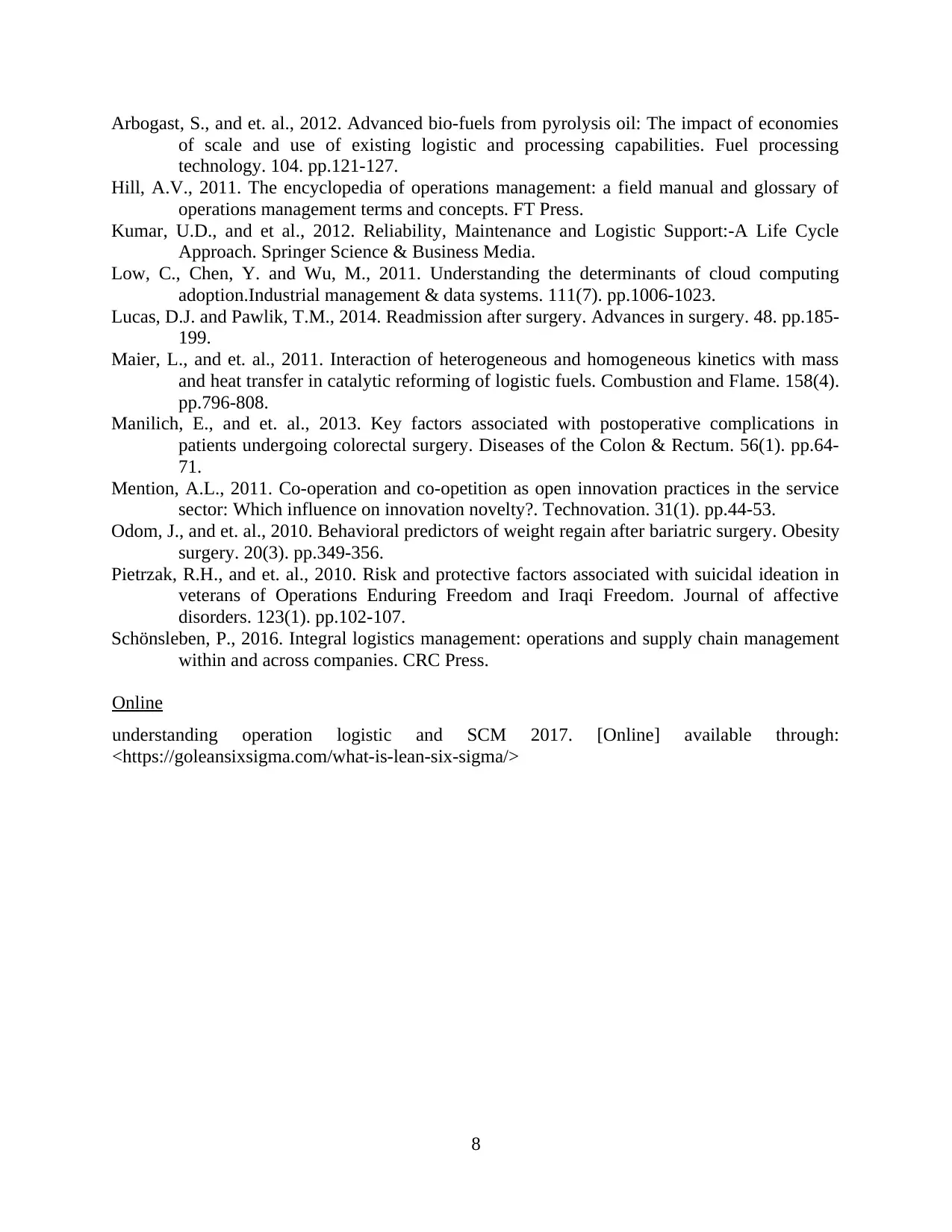
Arbogast, S., and et. al., 2012. Advanced bio-fuels from pyrolysis oil: The impact of economies
of scale and use of existing logistic and processing capabilities. Fuel processing
technology. 104. pp.121-127.
Hill, A.V., 2011. The encyclopedia of operations management: a field manual and glossary of
operations management terms and concepts. FT Press.
Kumar, U.D., and et al., 2012. Reliability, Maintenance and Logistic Support:-A Life Cycle
Approach. Springer Science & Business Media.
Low, C., Chen, Y. and Wu, M., 2011. Understanding the determinants of cloud computing
adoption.Industrial management & data systems. 111(7). pp.1006-1023.
Lucas, D.J. and Pawlik, T.M., 2014. Readmission after surgery. Advances in surgery. 48. pp.185-
199.
Maier, L., and et. al., 2011. Interaction of heterogeneous and homogeneous kinetics with mass
and heat transfer in catalytic reforming of logistic fuels. Combustion and Flame. 158(4).
pp.796-808.
Manilich, E., and et. al., 2013. Key factors associated with postoperative complications in
patients undergoing colorectal surgery. Diseases of the Colon & Rectum. 56(1). pp.64-
71.
Mention, A.L., 2011. Co-operation and co-opetition as open innovation practices in the service
sector: Which influence on innovation novelty?. Technovation. 31(1). pp.44-53.
Odom, J., and et. al., 2010. Behavioral predictors of weight regain after bariatric surgery. Obesity
surgery. 20(3). pp.349-356.
Pietrzak, R.H., and et. al., 2010. Risk and protective factors associated with suicidal ideation in
veterans of Operations Enduring Freedom and Iraqi Freedom. Journal of affective
disorders. 123(1). pp.102-107.
Schönsleben, P., 2016. Integral logistics management: operations and supply chain management
within and across companies. CRC Press.
Online
understanding operation logistic and SCM 2017. [Online] available through:
<https://goleansixsigma.com/what-is-lean-six-sigma/>
8
of scale and use of existing logistic and processing capabilities. Fuel processing
technology. 104. pp.121-127.
Hill, A.V., 2011. The encyclopedia of operations management: a field manual and glossary of
operations management terms and concepts. FT Press.
Kumar, U.D., and et al., 2012. Reliability, Maintenance and Logistic Support:-A Life Cycle
Approach. Springer Science & Business Media.
Low, C., Chen, Y. and Wu, M., 2011. Understanding the determinants of cloud computing
adoption.Industrial management & data systems. 111(7). pp.1006-1023.
Lucas, D.J. and Pawlik, T.M., 2014. Readmission after surgery. Advances in surgery. 48. pp.185-
199.
Maier, L., and et. al., 2011. Interaction of heterogeneous and homogeneous kinetics with mass
and heat transfer in catalytic reforming of logistic fuels. Combustion and Flame. 158(4).
pp.796-808.
Manilich, E., and et. al., 2013. Key factors associated with postoperative complications in
patients undergoing colorectal surgery. Diseases of the Colon & Rectum. 56(1). pp.64-
71.
Mention, A.L., 2011. Co-operation and co-opetition as open innovation practices in the service
sector: Which influence on innovation novelty?. Technovation. 31(1). pp.44-53.
Odom, J., and et. al., 2010. Behavioral predictors of weight regain after bariatric surgery. Obesity
surgery. 20(3). pp.349-356.
Pietrzak, R.H., and et. al., 2010. Risk and protective factors associated with suicidal ideation in
veterans of Operations Enduring Freedom and Iraqi Freedom. Journal of affective
disorders. 123(1). pp.102-107.
Schönsleben, P., 2016. Integral logistics management: operations and supply chain management
within and across companies. CRC Press.
Online
understanding operation logistic and SCM 2017. [Online] available through:
<https://goleansixsigma.com/what-is-lean-six-sigma/>
8
1 out of 10
Related Documents
Your All-in-One AI-Powered Toolkit for Academic Success.
+13062052269
info@desklib.com
Available 24*7 on WhatsApp / Email
![[object Object]](/_next/static/media/star-bottom.7253800d.svg)
Unlock your academic potential
Copyright © 2020–2026 A2Z Services. All Rights Reserved. Developed and managed by ZUCOL.




